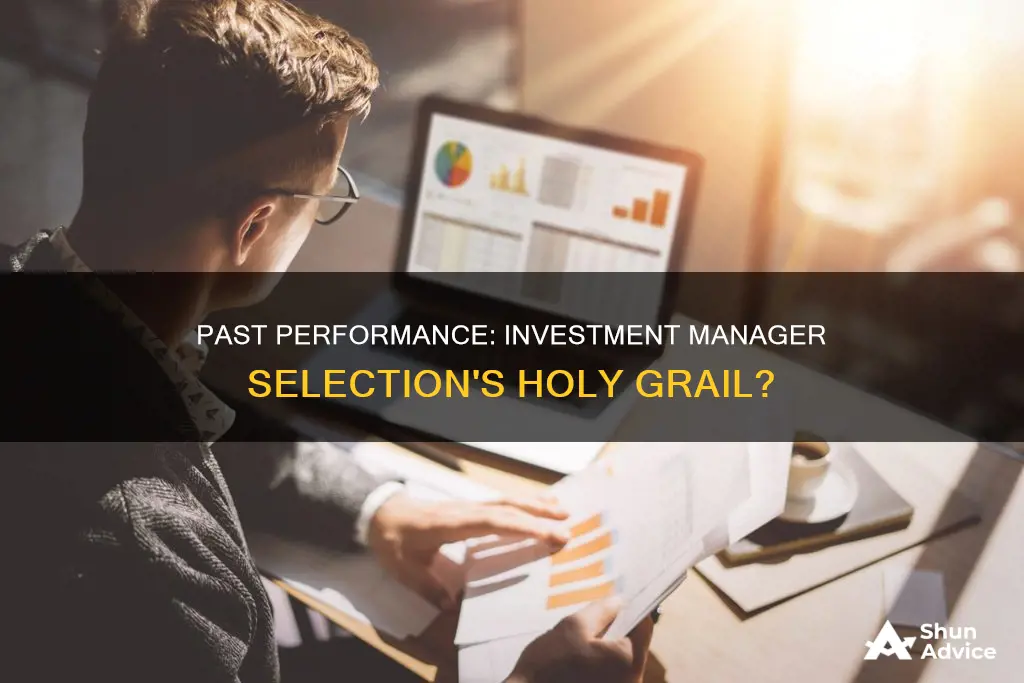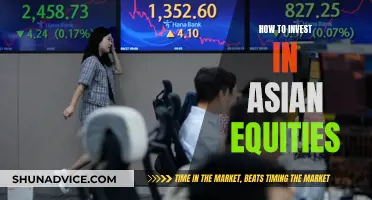
When selecting an investment manager, does their past performance matter? This is a key question for investors, who often rely heavily on past returns when making fund recommendations. While it is one of the cardinal principles of mutual fund selection, there is little research on whether past performance is a good indicator of future success. Indeed, some studies suggest that past performance is not a sufficient condition when selecting a fund, and that other factors, such as fund manager experience, should be considered.
| Characteristics | Values |
|---|---|
| Track record | Recent performance is not indicative of future performance |
| Manager selection | Should not be based on past performance alone |
| Investor behaviour | Investors tend to select managers based on recent performance |
| Fund selection | Past performance is not a sufficient condition; other factors like risk, fund style, and manager experience should be considered |
| Performance metrics | Various metrics such as standard deviation, Sharpe ratio, and upside-downside capture should be evaluated |
| Fund house reputation | Qualitative factors like fund house reputation and manager experience are important considerations |
| Fund performance | Persistence of performance varies across fund categories (large-cap, mid-cap, small-cap) |
What You'll Learn
- Past performance is not a sufficient condition for future results
- Recent performance can be a contrarian indicator
- Superior managers exhibit mean reversion
- A strategy of hiring managers with mediocre track records can be effective
- Other factors like risk, fund style and fund manager experience are important

Past performance is not a sufficient condition for future results
While past performance is often used as a key indicator when selecting an investment manager, it is not a sufficient condition for future results. This is because past performance does not contain useful information about future outperformance. In fact, recent performance can often be a contrarian indicator.
A study by Cornell, Hsu, and Nanigian found that asset owners who select managers based only on strong recent outperformance are likely to have much worse long-term performance than those who randomly select managers without examining track records. This is because of the mean reversion in manager performance. A strategy of hiring managers with mediocre track records seems to outperform a strategy that focuses on past winners.
Additionally, it is important to consider other factors when selecting an investment manager, such as fund house reputation and fund manager experience. Other studies have also shown that while past performance can be an indicator, it is not a sufficient condition. For example, a study by Akash Jain found that only 48% of large-cap funds in the first quartile remained in the first or second quartile over a subsequent five-year period. This shows that while past performance may be a factor to consider, it is not a guarantee of future results.
It is also important to evaluate the portfolio construction and management to understand the risks in the scheme. This includes looking at measures like standard deviation, the Sharpe ratio, and upside-downside capture, in addition to just returns. By considering a range of factors and not solely relying on past performance, investors can make more informed decisions when selecting an investment manager.
Mock Investment Portfolios: Where to Start Building Yours?
You may want to see also

Recent performance can be a contrarian indicator
Recent performance is often a misleading indicator when selecting an investment manager. Asset owners who select managers based solely on strong recent outperformance are likely to experience much worse long-term performance than those who randomly select managers without examining track records. This is because the recent track record of an active manager contains no useful information about their future outperformance.
A study by Cornell, Hsu, and Nanigian found that the investment manager selection methodology commonly employed by industry practitioners turns out to be detrimental to performance. They discovered that a strategy of hiring managers with mediocre track records outperforms a strategy that focuses on past winners.
This is further supported by a study by Akash Jain, which found that only 48% of large-cap funds in the top quartile remained in the top two quartiles over the subsequent five years. Similarly, only 43% of mid- and small-cap funds in the top quartile maintained their performance in the top two quartiles. These results indicate that while past performance may be a factor to consider, it is not a sufficient condition for selecting an investment manager.
Another study by Shwetabh Sameer of Morningstar used a 14-year data set and found that while there was some persistence of returns among large-cap funds, there was little evidence of this in the mid- and small-cap categories. This suggests that past performance may be less indicative of future results for smaller funds.
A more recent study by Mobikwik, which examined data from 2013 to 2019, found that only around two out of every five large-cap funds remained in the top two quartiles in all four rolling periods. This proportion decreased for mid- and small-cap funds, highlighting the unpredictable nature of investment performance.
In conclusion, while past performance may be one of many factors to consider when selecting an investment manager, it should not be the sole or primary criterion. Other factors such as fund house reputation, fund manager experience, risk, fund style, and portfolio construction should also be carefully evaluated to make an informed decision.
CDs: Macroeconomics Investment or Savings Strategy?
You may want to see also

Superior managers exhibit mean reversion
The concept of mean reversion is a widely used financial theory that suggests that an asset's price will eventually return to its long-term average. This is based on the belief that asset prices and historical returns will move towards a long-term average over time. The greater the deviation from this mean, the higher the probability of the asset's price moving closer to it in the future.
Mean reversion is a prominent concept in technical analysis, helping traders identify when an asset is overbought or oversold, thus providing potential entry and exit points.
In the context of investment manager selection, it is important to note that the recent track record of an active manager does not provide useful information about their future performance. In fact, recent performance can often be a contrarian indicator. Asset owners who select managers based solely on strong recent outperformance are likely to experience worse long-term results than those who randomly select managers without considering track records.
This phenomenon, known as mean reversion, suggests that even superior managers will eventually revert to the mean in terms of performance. Therefore, investors should focus on factors other than past performance when selecting investment managers.
Several studies have analysed the relationship between past performance and future results in investment management. One study examined the decisions of over 2,000 US pension plan sponsors, involving $1.6 trillion in funds and 775 fund managers. The findings indicated that post-hiring returns for chosen fund managers were significantly lower than those for managers who were not selected, suggesting that past performance is not a reliable indicator of future success.
Another study by Cornell, Hsu, and Nanigian simulated investor portfolios and compared the performance of different strategies: the winner strategy (selecting funds in the top decile of benchmark-adjusted returns), the median strategy (selecting funds between the 45th and 55th percentile), and the loser strategy (selecting funds in the bottom decile of benchmark-adjusted returns). They found that the loser strategy consistently outperformed the winner and median strategies, highlighting the ineffectiveness of choosing managers based on recent outperformance.
Additionally, the study by Cornell, Hsu, and Nanigian also examined the top 25% of outperforming funds and found that they exhibited a decline in future performance. This further reinforces the concept of mean reversion, even among superior managers.
In summary, while past performance may provide some insights, it is not a reliable indicator of future results in investment management. The concept of mean reversion suggests that superior managers will eventually revert to the mean in terms of performance. Therefore, investors should consider a range of factors beyond past performance when selecting investment managers.
Life Insurance: An Investment Portfolio Essential?
You may want to see also

A strategy of hiring managers with mediocre track records can be effective
A strategy of hiring investment managers with mediocre track records can be more effective than hiring those with strong past performance. This is because the recent track record of an active manager does not indicate their future success. In fact, recent performance can often be a contradictory indicator.
A study by Cornell, Hsu, and Nanigian found that asset owners who select managers based only on strong recent outperformance are likely to have much worse long-term performance than those who randomly select managers without examining track records. Their research showed that a strategy of hiring managers with mediocre track records outperformed a strategy that focuses on past winners.
Another study by Akash Jain of S&P BSE Indices looked at fund performances over a five-year period from 2008 to 2013 and found that only 48% of large-cap funds in the top quartile remained in the top two quartiles over the subsequent five years. This indicates that past performance is not a sufficient condition for future success, as less than 50% of the top-performing funds were able to maintain their performance.
A similar study by Shwetabh Sameer of Morningstar used a 14-year data set from 2001 to 2015 and found that while there was some persistence of returns among large-cap funds, there was little evidence of this in the mid- and small-cap categories. This suggests that past performance may be less indicative of future results in smaller funds.
Therefore, while past performance can be one factor in investment manager selection, it should not be the only criterion. Other factors such as fund house reputation, fund manager experience, risk, fund style, and portfolio construction should also be considered to make a more informed decision.
Savings Glut: When Saving Outpaces Investment
You may want to see also

Other factors like risk, fund style and fund manager experience are important
When selecting an investment manager, it is important to look beyond past performance and consider other factors such as risk, fund style, and fund manager experience.
Risk management is an essential aspect of investing. It involves identifying and analysing potential risks and rewards associated with an investment decision. By understanding the risks involved, investors can make informed choices about whether to accept, avoid, retain, share, or transfer the risks. Diversification of investments is a common strategy to mitigate overall risk. Additionally, risk management strategies such as currency hedging, portfolio diversification, and the use of financial instruments like options and futures can help reduce potential losses.
Fund style, or investment style, is another crucial factor in investment manager selection. It refers to the method and philosophy followed by a fund manager in selecting investments for a portfolio. Common styles include conservative, moderate, and aggressive approaches, which are differentiated primarily by the level of risk involved. Investment styles can also be categorised based on growth vs. value, market capitalization, and other factors. Understanding the fund style helps set expectations for risk and potential returns, allowing investors to choose a strategy that aligns with their risk tolerance and investment goals.
The experience and expertise of the fund manager are also important considerations. The investment manager's track record, investment philosophy, and decision-making process should be evaluated to assess their skill and likelihood of future success. The manager's infrastructure, operations, integrity, and personnel are also subject to due diligence to ensure they have the necessary resources and capabilities to achieve the desired investment objectives.
While past performance may provide some insights, it is not always indicative of future results. Therefore, a comprehensive evaluation should consider multiple factors to make an informed decision when selecting an investment manager.
Building a Solid Investment Portfolio: RIA Strategies
You may want to see also
Frequently asked questions
Past performance is not a sufficient condition when selecting an investment manager. While it can provide some insight into their capabilities, other factors such as fund style, manager experience, and risk management should also be considered.
Relying solely on past performance can lead to poor long-term results. Managers with strong recent returns may underperform in the future, and those with mediocre track records may outperform expectations. It's important to evaluate the overall portfolio construction and management to understand the risks involved.
Consider factors such as the fund house reputation, manager experience, risk management, and the investment objective of the fund. Evaluate the portfolio for sharp changes or value traps that may impact future performance. Additionally, consider the management team's experience and the fund house's reputation.
Yes, several studies by Morningstar, S&P Dow Jones, and Mobikwik have found that past performance is not a sufficient condition for future success. For example, a study by S&P Dow Jones examined fund performances from 2008 to 2013 and found that less than 50% of the top-performing funds remained in the top quartile over the subsequent five years.







